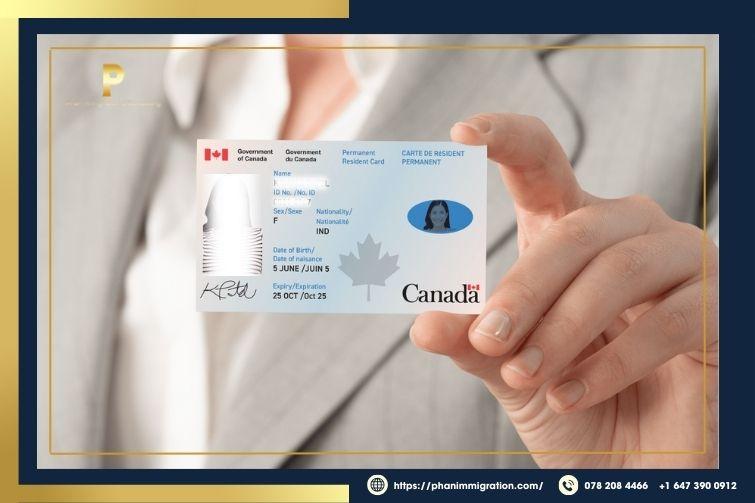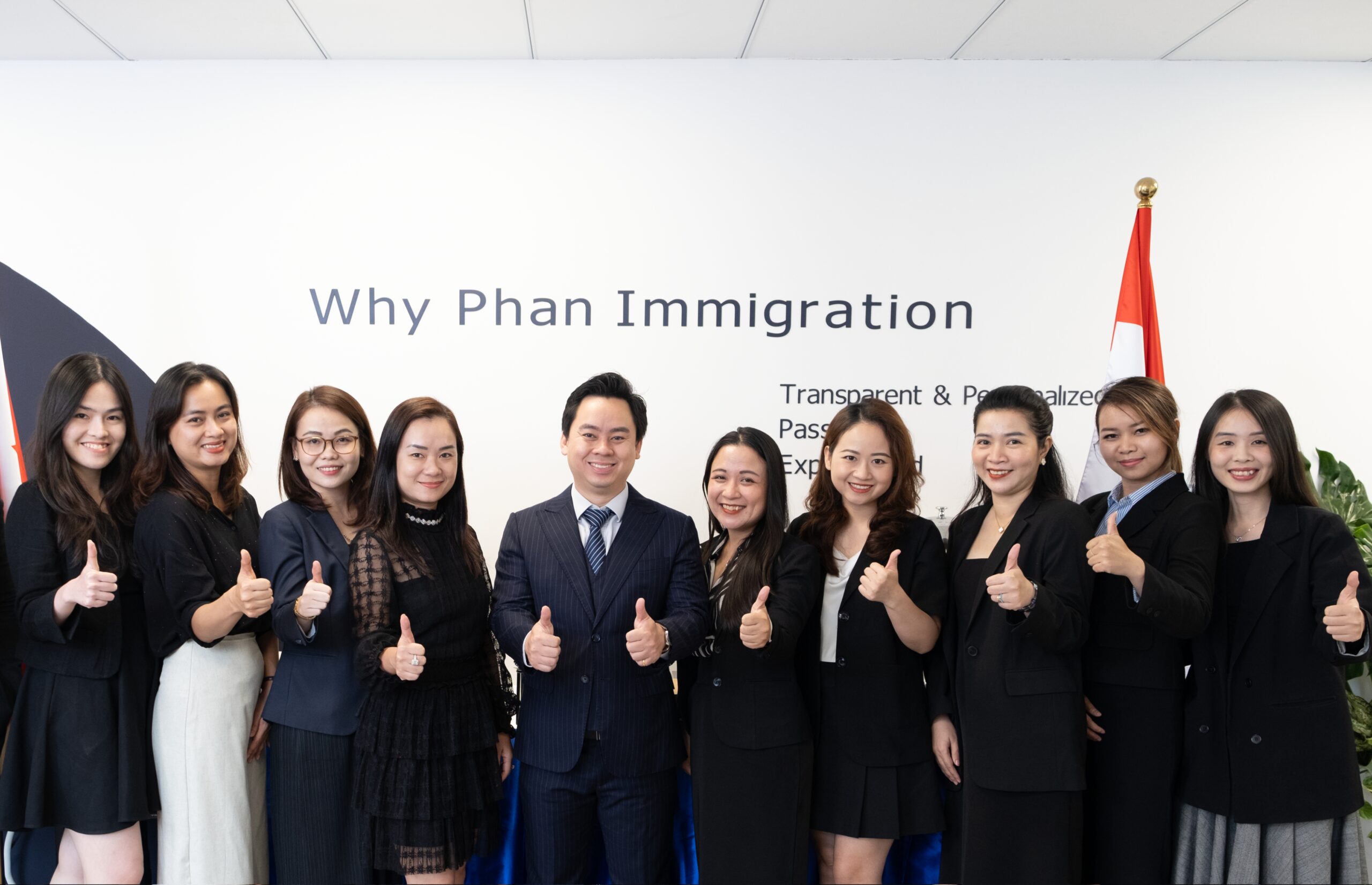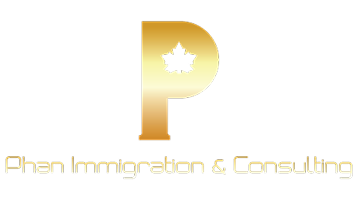For a long time, Canada has been a dream destination for many people around the world, especially for skilled workers. If you’re also dreaming of settling in Canada, the Federal Skilled Worker Program is the ideal choice. Let’s explore the conditions and benefits of participating in this program in the following article with Phan Immigration.
Introduction to the Federal Skilled Worker Program (FSWP)
The Federal Skilled Worker Program (FSWP) was established in 1967 by the Canadian government to select global candidates based on various criteria such as language proficiency, age, education, profession, and work experience.
The FSWP is part of the Canada Express Entry system for Canadian immigration. Through the CRS (Comprehensive Ranking System), Canada evaluates and selects eligible candidates who wish to settle permanently.

Eligibility requirements for the Federal Skilled Worker (FSWP) program
Applicants must score at least 67/100 Express Entry points to be eligible for the FSWP program. The selection factors include:
Education (Maximum 25 points)
You must attach your Canadian degree or foreign diploma and an Educational Credential Assessment (ECA) report when submitting your application.
You can earn up to 25 points based on your education level:
| Education Level | Points (Maximum 25 points) |
| PhD | 25 points |
| Master’s degree or professional degree (from NOC TEER 1 list, regulated by a provincial body, and in fields such as: Medicine, Veterinary, Dentistry, Orthopedics, Optometry, Law, Osteopathy, or Pharmacy) | 23 points |
| Two post-secondary certificates, at least one lasting 3 years or more | 22 points |
| Post-secondary diploma lasting 3 years or more | 21 points |
| Post-secondary certificate lasting 2 years | 19 points |
| Post-secondary certificate lasting 1 year | 15 points |
| High school diploma | 5 points |
Language Skills (Maximum 28 points)
You can earn a maximum of 28 points for language proficiency in the FSWP program, based on your proficiency in English and/or French:
- Up to 24 points for proficiency in your first language (English or French – you can choose when submitting your application).
- An additional up to 4 points if you are proficient in the second language.
Note: You can choose English or French as your primary or secondary language, depending on your strengths.
For the First Official Language (Maximum 24 points)
| First Official Language | Speaking | Listening | Reading | Writing | Total |
| CLB Level 9 or above | 6 | 6 | 6 | 6 | 24 |
| CLB Level 8 | 5 | 5 | 5 | 5 | 20 |
| CLB Level 7 | 4 | 4 | 4 | 4 | 16 |
| Below CLB Level 7 | Not eligible to apply | Not eligible to apply | Not eligible to apply | Not eligible to apply | Not eligible to apply |
Second Official Language (Maximum 4 points)
| Second Official Language | Points |
| At least CLB 5 in all 4 skills | 4 |
| CLB Level 4 or below in any skill | 0 |
Work Experience (Maximum 15 points)
To earn points in this category, you must meet the following requirements:
- At least 1 year of continuous experience or a total of 1,560 hours in the past 10 years (in Canada or abroad).
- The work must be paid (salary or commission), excluding volunteer or unpaid internships.
- The work must fall under TEER 0, 1, 2, or 3 in the NOC system, with the same NOC code as your primary occupation.
- You must demonstrate that you have performed most of the key duties in the NOC job description.
Valid Experience Accumulation Methods:
- Full-time work: 30 hours/week for 12 months.
- Part-time work: Total of 1,560 hours (can be accumulated from multiple jobs).
- Hours beyond 30 hours/week are not counted.
- Work experience during study is eligible if paid, continuous, and meets the FSWP requirements.
Refer to the following table for the points corresponding to your eligible work experience:
| Experience | Points |
| 1 year | 9 |
| 2 – 3 years | 11 |
| 4 – 5 years | 13 |
| 6 or more years | 15 |
Age (Maximum 12 points)
Points will be awarded based on your age on the day IRCC receives your application.
| Age | Points |
| Under 18 | 0 |
| 18 – 35 | 12 |
| 36 | 11 |
| 37 | 10 |
| 38 | 9 |
| 39 | 8 |
| 40 | 7 |
| 41 | 6 |
| 42 | 5 |
| 43 | 4 |
| 44 | 3 |
| 45 | 2 |
| 46 | 1 |
| 47 and above | 0 |
Job Offer from a Canadian Employer
You will earn points for this factor if you have a valid job offer from a Canadian employer for at least 1 year. You must receive the job offer before you submit your application under the Federal Skilled Worker Program. The job offer must meet the following criteria:
- Full-time employment (at least 30 hours/week), continuous, paid, with a minimum duration of 1 year, and not seasonal work.
- The job must be in an occupation listed under TEER 0, 1, 2, or 3 of the NOC.
IRCC will also assess to ensure that:
- You are capable of performing the job you are being offered.
- You can obtain a work permit or certification (if the occupation is regulated in Canada).
To earn the maximum 10 points for the arranged employment factor, you must meet one of the following scenarios:
Scenario 1: You are already working in Canada under a work permit and meet all the following conditions
- Your work permit is valid at the time of your application and at the time the permanent residence visa is issued (or you are allowed to work in Canada without a work permit when your visa is issued).
- Your work permit was issued based on a Labour Market Impact Assessment (LMIA) from Employment and Social Development Canada for an occupation listed under TEER 0, 1, 2, or 3 of the NOC.
- You are working for the employer specified on your work permit.
- That employer has provided you with a valid job offer based on your qualification as a skilled worker.
Scenario 2: You are currently working in Canada in a job exempt from LMIA requirements due to one of the following reasons:
- An international agreement.
- Significant benefit to Canada.
- A federal-provincial agreement.
You must also meet all of the following conditions: - Your work permit is valid at the time of your application and at the time the permanent residence visa is issued (or you are allowed to work in Canada without a work permit when your visa is issued).
- Your current employer has provided a valid job offer based on your qualification as a skilled worker.
- You are working for the employer specified on your work permit.
- You have worked for that employer for at least 1 continuous full-time year or equivalent part-time.
Scenario 3: You must meet all of the following conditions:
- You do not have a work permit or any plan to work in Canada before receiving your PR.
- An employer has LMIA approval.
- The employer has sent you a valid job offer based on that LMIA and on your qualification as a skilled worker.
Scenario 4: You must meet all of the following conditions:
- You have a valid work permit or are allowed to work in Canada without a work permit.
- You are working in Canada in a job exempt from LMIA, but not under an international federal-provincial agreement or for the benefit of Canada.
- A different employer than the one you are currently working for:
- The new employer will send you a valid job offer based on the LMIA and your qualification as a skilled worker.
Adaptability (Maximum 10 Points)
You and your spouse or common-law partner, who will be accompanying you to Canada, can receive points for the adaptability factor.
You and your spouse can earn up to 10 points by combining any of the following factors, which will assess how well your family can settle in Canada:
| Adaptability Factors | Points (Maximum 10 Points) |
| Worked full-time for at least 1 year in Canada in TEER 0, 1, or 2 skill jobs | 10 points |
| Completed at least 2 years of secondary education or higher in Canada | 5 points |
| Spouse or common-law partner has completed at least 2 years of study in Canada | 5 points |
| Spouse or common-law partner has at least 1 year of work experience in Canada | 5 points |
| Have a valid job offer in Canada | 5 points |
| Have a close relative over 18 years old living in Canada as a citizen or permanent resident | 5 points |
| Spouse or common-law partner has language proficiency of CLB 4 or higher in all 4 skills | 5 points |

Benefits of participating in the federal skilled worker program
Benefits of participating in the Federal Skilled Worker Program:
- Receive permanent residency (PR), allowing you to live and work in Canada long-term.
- No requirement for prior work or study experience in Canada.
- No job offer required when submitting your application.
- Fair evaluation through the CRS system, based on factors such as skills, education, language, and work experience.
- Fast processing time, usually within 6 months.
- Freedom to choose where to live and work in any province of Canada.
- Full access to social benefits, including healthcare, education, and social security, similar to citizens.
- Eligibility to apply for Canadian citizenship after meeting the required residency period.
- Ability to sponsor family members to join you in Canada.
- International qualifications are recognized, and points can be added to CRS if the ECA is valid.
- Comprehensive language evaluation (English, French), with additional CRS points for bilingual skills.
- Can include spouse and dependent children in the immigration application.
- Spouse can add points to CRS if they have relevant qualifications, language skills, or work experience.
- Access to Canada’s dynamic labor market, with good wages and employment standards.
- Settlement assistance for newcomers, including language training and job search support.
- Increased chances of receiving a Provincial Nominee Program (PNP) nomination if CRS points are insufficient.
- Provides a stable and long-term life for the entire family in Canada, enhancing overall quality of life, career, and education opportunities.

See also: What is ITA? How to receive an Invitation to Apply (ITA) for Canadian immigration.
Required Documents for Federal Skilled Worker Program (FSWP) Canada Immigration
To participate in the FSWP program, applicants must prepare the following documents:
- Passport or Travel Document:
- If your passport will expire within 6 months from the application submission date, you should renew your passport. Once you receive the new passport, update your passport information in your application.
- If you carry a Venezuelan passport, additional steps may be required when creating your profile or filling out your application.
- Language Test Results:
- Language test results from a recognized third-party organization (such as IELTS, CELPIP, TEF, TCF) showing your proficiency in English or French.
- Proof of Education or Educational Credential Assessment (ECA):
- If you are applying through the FSWP, or if you wish to claim points for your foreign education, you must provide proof of education or an ECA report for immigration purposes.
- Job Offer (if applicable):
- A written job offer from an employer in Canada (if available).
- Proof of Work Experience:
- Evidence of work experience (such as reference letters or experience letters from employers).
- Trade Certification (if applicable):
- Proof of trade certification issued by a province or territory in Canada (if applicable).
- Proof of Financial Capability:
- Evidence of sufficient financial resources to support yourself and your family in Canada.
- Police Certificate:
- Police certificate(s) from each country or territory where you have lived for 6 months or more since the age of 18.
- Provincial Nomination (if applying through Provincial Nominee Program – PNP):
- If you are applying through a Provincial Nominee Program (PNP), provide evidence of a provincial nomination.
These documents are required for your application to the Federal Skilled Worker Program. Ensure all documents are accurate and updated for a successful immigration process.
Process for Canadian Immigration through the Federal Skilled Worker Program (FSWP)
To immigrate to Canada under the Federal Skilled Worker Program (FSWP) through the Express Entry system, applicants need to follow these steps:
Step 1: Check Eligibility for the FSWP Program
-
- Ensure that you meet the eligibility criteria for the FSWP, such as work experience, education, language proficiency, and more.
Step 2: Create and Submit an Express Entry Profile on the IRCC Website
-
- Create your profile on the official IRCC (Immigration, Refugees, and Citizenship Canada) website and submit your application to the Express Entry system.
Step 3: Receive an Invitation to Apply (ITA)
-
- If you have a high Comprehensive Ranking System (CRS) score, you may receive an ITA (Invitation to Apply) within approximately 2 weeks.
Step 4: Complete Your Application and Submit It to IRCC
-
- After receiving the ITA, complete your application and submit it to IRCC. If your application is approved, you will receive Permanent Residency (PR) and can move to Canada within about 6 months.
For a smooth and accurate application process, as well as to increase your chances of success, it is advisable to have professional guidance from an immigration consultancy like Phan Immigration. We offer comprehensive services, including profile optimization and assistance with the entire process, helping you save time and improve your chances of successful immigration.
Contact us now for support from our experienced immigration experts.
What is the difference between the three programs: FSWP, FSTP, and CEC in Express Entry?
FSWP is one of two federal immigration programs for skilled workers under the Express Entry system, alongside the Canadian Experience Class (CEC) and the Skilled Trades immigration (FSTP). These programs, however, have some differences, as outlined below:
| Criteria | Federal Skilled Worker Program (FSWP) | Federal Skilled Trades Program (FSTP) | Canadian Experience Class (CEC) |
| Target Audience | High-skilled workers in various fields worldwide with education and professional work experience. | Skilled tradespeople in specific occupations that are in demand in Canada (typically trade jobs). | Individuals with at least 1 year of work experience in Canada who wish to transition to permanent residency. |
| Canadian Work Experience Requirement | Work experience in Canada within TEER 0, 1, 2, or 3 occupations. | Work experience in Canada or abroad in TEER 0, 1, 2, or 3 occupations. | Work experience in Canada or internationally in skilled trade (TEER 2 or 3). |
| Skill Type | Broad professional skills across various sectors. | Technical skilled trades focused on occupations in high demand. | Diverse skills suited to those who have worked in various occupations in Canada. |
| Job Offer Requirement | No job offer required for application. However, if a valid job offer is received, CRS points are added. | Requires at least one of the following: – A full-time job offer for at least one year from a Canadian employer. – A valid certificate of qualification from a Canadian province/territory. | No job offer required for application. However, if a valid job offer is received, CRS points are added. |
| Education Level | Requires education at least equivalent to a high school diploma. Foreign degrees must have an ECA. | No specific education requirements. However, technical certifications or qualifications are highly valued. | No specific education requirements. Education still counts towards CRS points and may help increase the total score. |
| Proof of Financial Support | Must demonstrate sufficient financial resources unless a valid job offer is available or working legally in Canada. | No requirement for proof of financial support. | No requirement for proof of financial support. |
| Main Strength | Suited for individuals with high educational qualifications and international professional experience, making it easier to compete for high CRS points. | Designed for skilled tradespeople with high technical skills to meet the demand for skilled labor. | Suited for individuals with Canadian work experience who wish to leverage that experience for faster immigration. |
Phan Immigration answers frequently asked questions about FSWP
Who can apply for the program?
Candidates can apply for the Federal Skilled Worker Program (FSWP) if they meet the following criteria:
- At least 1 year of continuous, full-time skilled work experience.
- Proficiency in English or French with a CLB 7 or higher.
- At least an education level equivalent to a Canadian high school diploma.
- Proof of financial ability to support themselves and their family while living in Canada (unless the applicant has a valid job offer).
- Applicants will be assessed using the Comprehensive Ranking System (CRS) under Express Entry.

How does the CRS system affect FSWP?
The CRS is a points-based system used to rank FSWP applicants based on factors like age, education, language proficiency, and work experience. The candidates with the highest CRS scores in the Express Entry pool are invited to apply for permanent residency. The CRS helps select applicants who have the potential to successfully settle in Canada.
How long does it take to process an FSWP application?
After receiving the Invitation to Apply (ITA) and submitting a complete application, the processing time for FSWP applications is usually around 6 months. However, the actual processing time can vary depending on factors like the number of applications in the queue and the verification of documents.
Is a job offer required?
No, it is not mandatory. However, if you have a valid job offer from a Canadian employer, you will receive additional CRS points. If not, you will need to demonstrate sufficient financial resources to support yourself in Canada.
Can I bring my family with me?
Yes, you can include your spouse or common-law partner and dependent children in your FSWP application. Once your application is approved, your entire family will receive permanent residency and will have the right to live, work, study, and access services in Canada.

With clear criteria, a transparent process, and many practical benefits, the Federal Skilled Worker Program (FSWP) – Canada’s Federal Skilled Worker immigration stream – is truly a golden opportunity for skilled workers looking for a stable, high-quality life and growth opportunities in Canada. If you are confident in your skills and experience, seize this opportunity to turn your dream of settling in Canada into reality.







